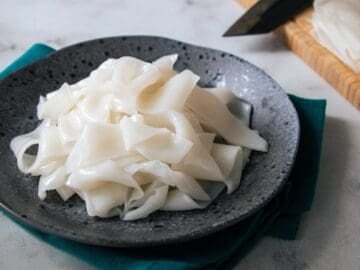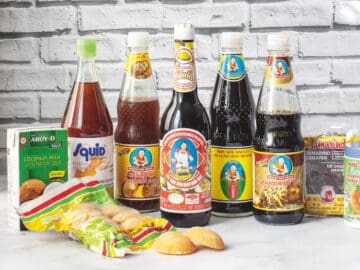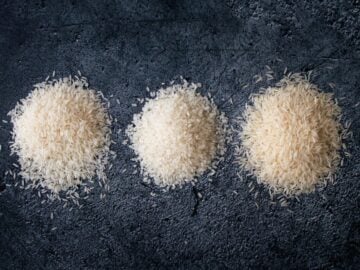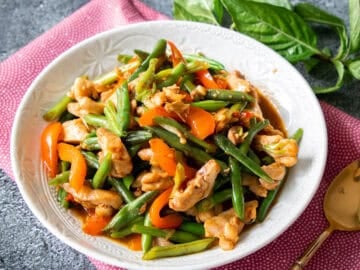So you love Thai food, but do you know how to eat it "correctly"? Yes there is a right way of doing it, and there are some important Thai dining etiquette to know as well! Of course you can eat food however you want to eat it, I'm here to argue that eating Thai food properly will actually make your meal taste better. Not to mention you won't look like a clueless tourist if you go to Thailand! Let's dive in.
You can read this post, but it is much easier to understand how to eat Thai food by watching it in action in this video!
What Utensils do Thai people eat with?
The most important thing to take away from this video is that Thai food is eaten with a fork and a spoon. Not just a fork. Not knife and fork. And not chopsticks (although we will talk about chopsticks later).
Here's how to use a fork and spoon like a Thai:

Want to save this recipe?
- The spoon goes into your dominant hand and the fork goes into your non-dominant hand and notice that the handle is resting on my index finger
- The back of the fork is facing the front of the spoon so they are kind of "spooning."
- The back of the fork pushes food onto the spoon. Compose the perfect bite with the right amount of rice and other things. Every bite should contain rice (more on this in a bit.)
- The spoon goes into your mouth. I know it is a habit for Westerners to use the fork to carry food into your mouth, but for Thai food, the spoon is what you want.
Why use a fork and a spoon for Thai food?
The reason Thai people use a fork and a spoon is because it is the most efficient way to eat our kind of food.
First, Thai food is served with long grain rice, most commonly jasmine rice, which is a little bit sticky but they don't really hold together all that well. So using a fork will result in half the rice falling off of your fork.
Second, and and I think most importantly, Thai food involves a lot of runny sauces. For example, Thai curries are thin and soupy, not thick like Indian curries might be. Our stir fry sauces are never thickened with starch so it's always runny. We have all these runny sauces everywhere, and so in order to capture all of the sauce, and therefore the flavor, you need a spoon.
Avoiding the dreaded end of the meal...
Having worked in Thai restaurants, I've seen far too many people struggle at the end of their meal. You know how it is, you've got a little bit of rice left and it's kind of wet from all the sauces. You've got just the fork and you're chasing it around the plate and nothing would get on. So you get desperate and ungracefully use your finger to push it on, and when you're really desperate you mush the rice with your fork so that it would stick and so you can finally eat that little last bit.
I've seen this so many times....and the spoon solves this problem!
How to Eat a Typical Thai Meal

Here's how a typical Thai meal would go: Thai meals are typically served family style, with the exception of "single dish meals" such as noodle soups.
There are typically multiple dishes in the center; if it's just a couple people maybe two things, but if it's a whole family 3-5 dishes is pretty typical.
Each dish has its own serving spoon.
Everyone starts out with a plate of rice with a fork and a spoon. Important: the rice is not a side dish. It is the foundation of the meal - everything is to be eaten with rice in the same bite.
If there's soup on the table you'll be given a little bowl for your soup, but you will not be given a separate bowl for curry. Curries can get spooned straight onto your rice.
Important Thai Dining Etiquette: This is not a buffet!
Don't load your plate with everything that you want to eat from the get go like it's a Thanksgiving dinner. You take a little bit of food at a time, maybe a couple bites of a couple things to start. Then when you are done, you can go back for more.
This etiquette is important because it ensures that everyone gets a little bit of everything, that you're not taking too much from the center all at once. This also ensures that you never end up with more food than you can eat on your plate because you're only taking a little at a time. So no food is wasted!
It's also very common for people to start with less rice than they think they're going to eat, and go back to refill.
Taking a little at a time also makes it a more interesting meal. It's like a Choose Your Own Adventure, so you can also be balancing your meal as you go. You might be starting with something rich, and maybe next you want to go with something lighter to cleanse the palate. THIS makes a better dining experience and keeps everything interesting!
Soup Etiquette
Some Asian cultures drink soup from the bowl as a common practice, but Thai people don't. At least not out in public! There are a few ways to tackle soup, so there aren't any rules here:
You can eat the soup a little at a time as you go to wash down the previous bite. You can put rice in the soup bowl, or you can even spoon some soup onto your rice on the plate.
Do Thai People Eat With Chopsticks?
When I worked in restaurants I had several customers asking me for chopsticks, and I think they were trying to be culturally sensitive thinking that Asian cuisines are all eaten with chopsticks. But not in Thailand.
Thai people don't eat our food with chopsticks for all of the same reasons we don't eat it with a fork. It doesn't work with our saucey, fall-aparty kind of food!
BUT sometimes we eat noodles with chopsticks. Noodles came to Thailand with Chinese immigrants, and along with the food also came the use of chopsticks. So it's very common to see Thai people eat noodle soups with chopsticks and a spoon but stir-fried noodles such as pad see ew and pad thai are more commonly eaten with a spoon and fork. Some Thai people of Chinese descent do prefer chopsticks for all kinds of noodles though. But in my family, we use a fork and spoon for everything.
Do Thai People Eat With Their Hands?
Thai people use our hands to eat some things, most commonly sticky rice because it's so sticky that it's actually easiest to just eat with your hands, and unlike sushi rice, it doesn't stick to your hands!
If you get a roti which is sometimes served with curries, it is okay to use your hands for that, too. And obviously any finger foods like chicken wings or spring rolls!
Do Thai People Use Dinner Knives?
What about a dinner knife...don't you need to cut things sometimes? Nope. Because all of our food comes pre-cut into bite-sized pieces, and anything that's not is soft enough to be cut with a fork and a spoon. I show you how this is done in the video above.
And that's it! I hope now you feel confident the next time you're having a Thai meal whether at home, in a restaurant, or in Thailand! And if you go to a Thai restaurant and they only give you a fork, ask them for the spoon and show them you know how it's done!





Eve says
wow, what a discovery. I was doing it al wrong. thank you for this episode
Fred Prager says
Hey Gary,
I have eaten at long tables and the main food plates are usually passed from person to person. It is your choice to either take a small portion and pass it on or defer to the next person. At large round tables there may be a spinning round platform in the center which can be spun to get to the dish you want. If not the etiquette seems to be the same as for a long table. On some really long tables I have seen two center stations of the same foods so the food doesn't have to go a long way. Khun Pai may have additional, or corrected, info.
Pailin Chongchitnant says
Excellent point to add, thanks for that, Fred!
Gary Starr says
Hi Pai,
What is the etiquette when eating at a long rectangular table?
Are dishes continually being passed along from person to person? Is it acceptable to reach over your fellow diners?
Pailin Chongchitnant says
What Fred said is correct, but also what usually happens is people will swap plates. So after everyone on this side of the table has had a chance to eat what's in front of them, you swap plated with the people on the other side of the table. You should not reach over people to get to a dish, but you can absolutely ask people to pass it to you, or in some cases the person next to you can even get you some food.